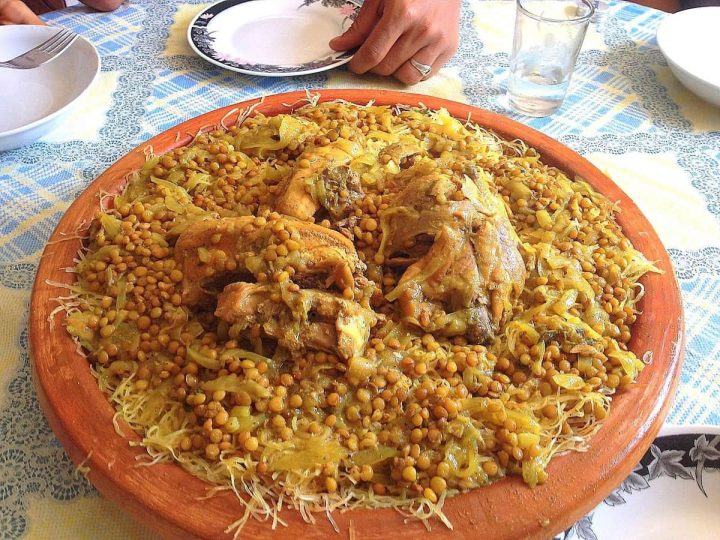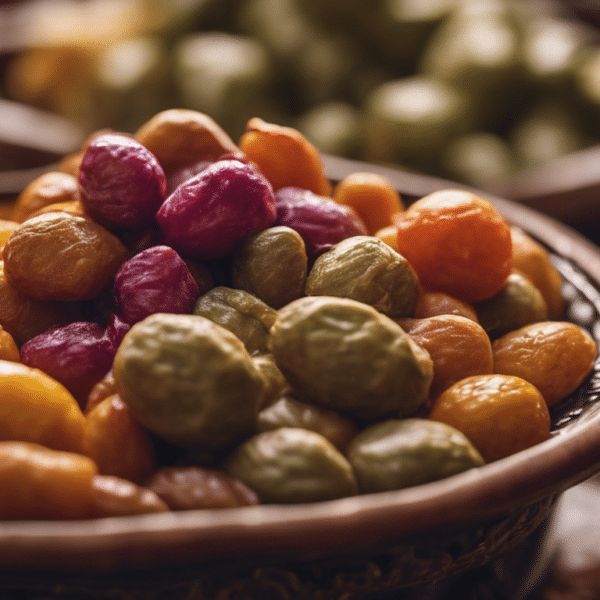- Published on
Moroccan Rfissa Unveiling the Rich History and Cultural Significance of this Traditional Dish
- Authors

- Name
- Adil ABBADI
Introduction
Moroccan cuisine is renowned for its rich flavors, aromas, and culinary diversity, with each dish having its own unique story and cultural significance. One such dish that holds a special place in Moroccan cuisine is Rfissa, a hearty, comforting stew that's traditionally served on special occasions, including weddings, holidays, and as a welcoming dish for guests. In this article, we'll delve into the history, cultural significance, and traditional preparation of Moroccan Rfissa, a dish that's an integral part of Moroccan heritage.
- What is Moroccan Rfissa?
- A Brief History of Rfissa
- Traditional Preparation of Rfissa
- Cultural Significance of Rfissa
- Modern Twists on Traditional Rfissa
- Conclusion
- Experience the Flavors of Rfissa
What is Moroccan Rfissa?
Rfissa is a traditional Moroccan dish made with slow-cooked meat, onions, chickpeas, spices, and dried fruits, typically served over a bed of bread or couscous. The name "Rfissa" is derived from the Arabic word "Arfa," meaning "layer" or "pile," referring to the layered cooking method used to prepare this dish.

A Brief History of Rfissa
Rfissa has its roots in the medieval period, when it was a dish served to royalty and high-ranking officials. The recipe was passed down through generations and adapted by various regions, resulting in different variations of Rfissa. In the 19th century, Rfissa became a staple in Moroccan cuisine, particularly during special occasions and holidays.
Traditional Preparation of Rfissa
The traditional preparation of Rfissa involves slow-cooking the ingredients over low heat for several hours. The dish is typically made with meat, such as beef or lamb, which is slow-cooked with onions, chickpeas, spices, and dried fruits. The mixture is then layered over bread or couscous and topped with a sauce made from the cooking liquid.
Here's a brief overview of the traditional Rfissa recipe:
- Ingredients:
- 1 lb beef or lamb
- 2 large onions
- 1 cup chickpeas
- 1 cup dried fruits (such as raisins and apricots)
- 2 tbsp spices (including cumin, coriander, and cinnamon)
- 4 slices of bread or 1 cup of couscous
- Instructions:
- Prepare the ingredients and cook the meat, onions, and chickpeas separately.
- Mix the cooked ingredients with the dried fruits and spices.
- Layer the mixture over bread or couscous.
- Top with a sauce made from the cooking liquid.

Cultural Significance of Rfissa
Rfissa plays a significant role in Moroccan culture and tradition. It's often served at weddings, holidays, and as a welcoming dish for guests. The layered cooking method used to prepare Rfissa is also a metaphor for the layers of Moroccan society, with each layer representing a different aspect of the community.
Rfissa is also a symbol of Moroccan hospitality, as it's often served to guests as a gesture of welcome and respect. In traditional Moroccan society, it was considered a sign of wealth and prosperity to serve Rfissa to guests, as the dish required slow-cooking and preparation over several hours.
Modern Twists on Traditional Rfissa
While traditional Rfissa remains a staple in Moroccan cuisine, modern variations have emerged, incorporating new ingredients and cooking methods. Some variations include:
- Vegetarian Rfissa: Made with vegetables such as eggplant and zucchini instead of meat.
- Seafood Rfissa: Made with seafood such as shrimp and mussels.
- Rfissa Tart: Made with a layer of pastry instead of bread.

Conclusion
Moroccan Rfissa is a dish that's steeped in history and cultural significance. Its rich flavors, aromas, and layered cooking method make it a unique and comforting dish that's perfect for special occasions. Whether you're looking to try traditional Rfissa or modern variations, this dish is sure to delight your taste buds and leave you with a lasting impression of Moroccan cuisine.
Experience the Flavors of Rfissa
Looking to try Rfissa for yourself? Try experimenting with the traditional recipe or modern variations. Share your experiences and photos with us, and don't forget to tag us!
To learn more about Moroccan cuisine and culture, follow us on social media and stay tuned for more articles on traditional Moroccan dishes.
